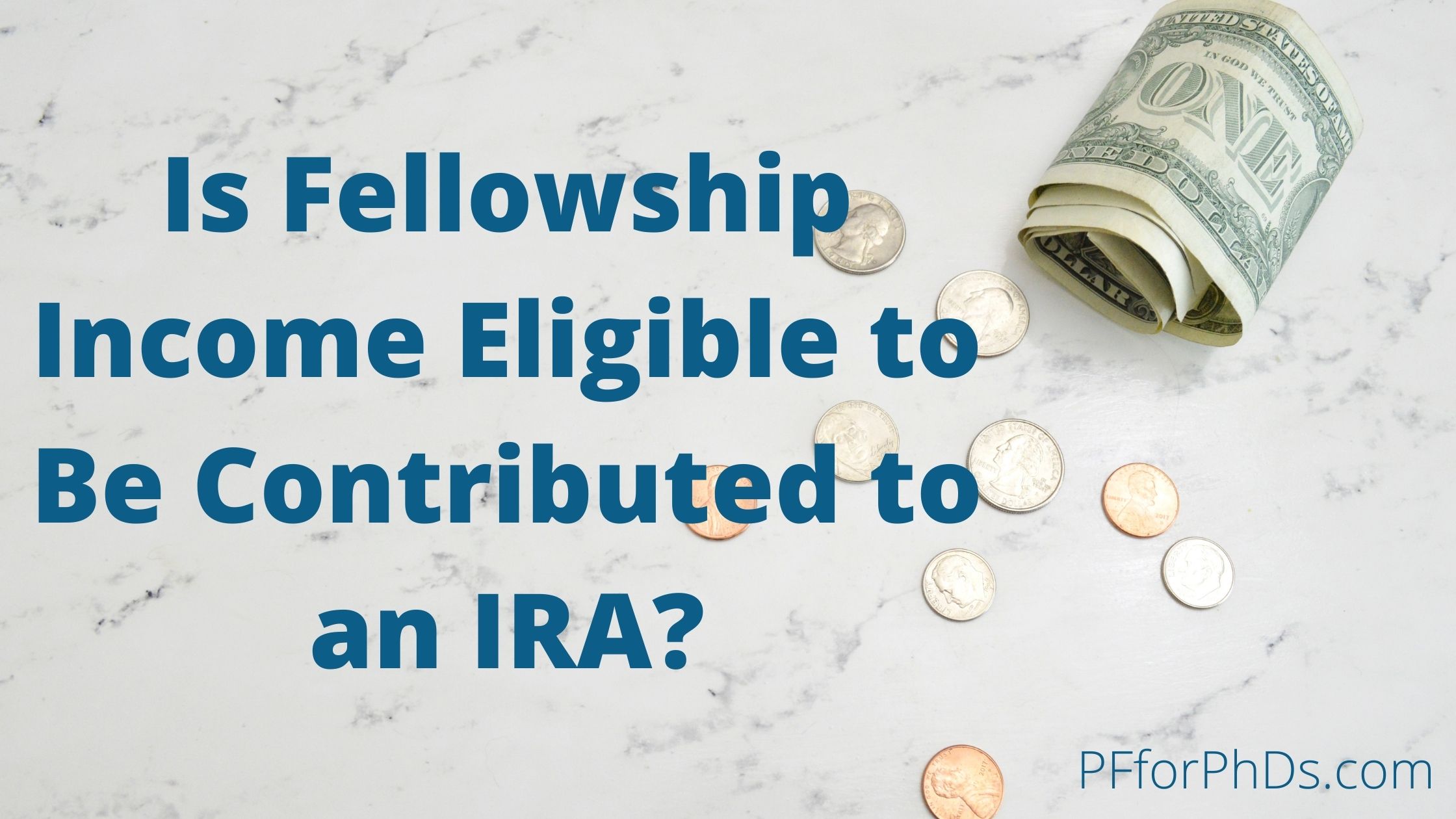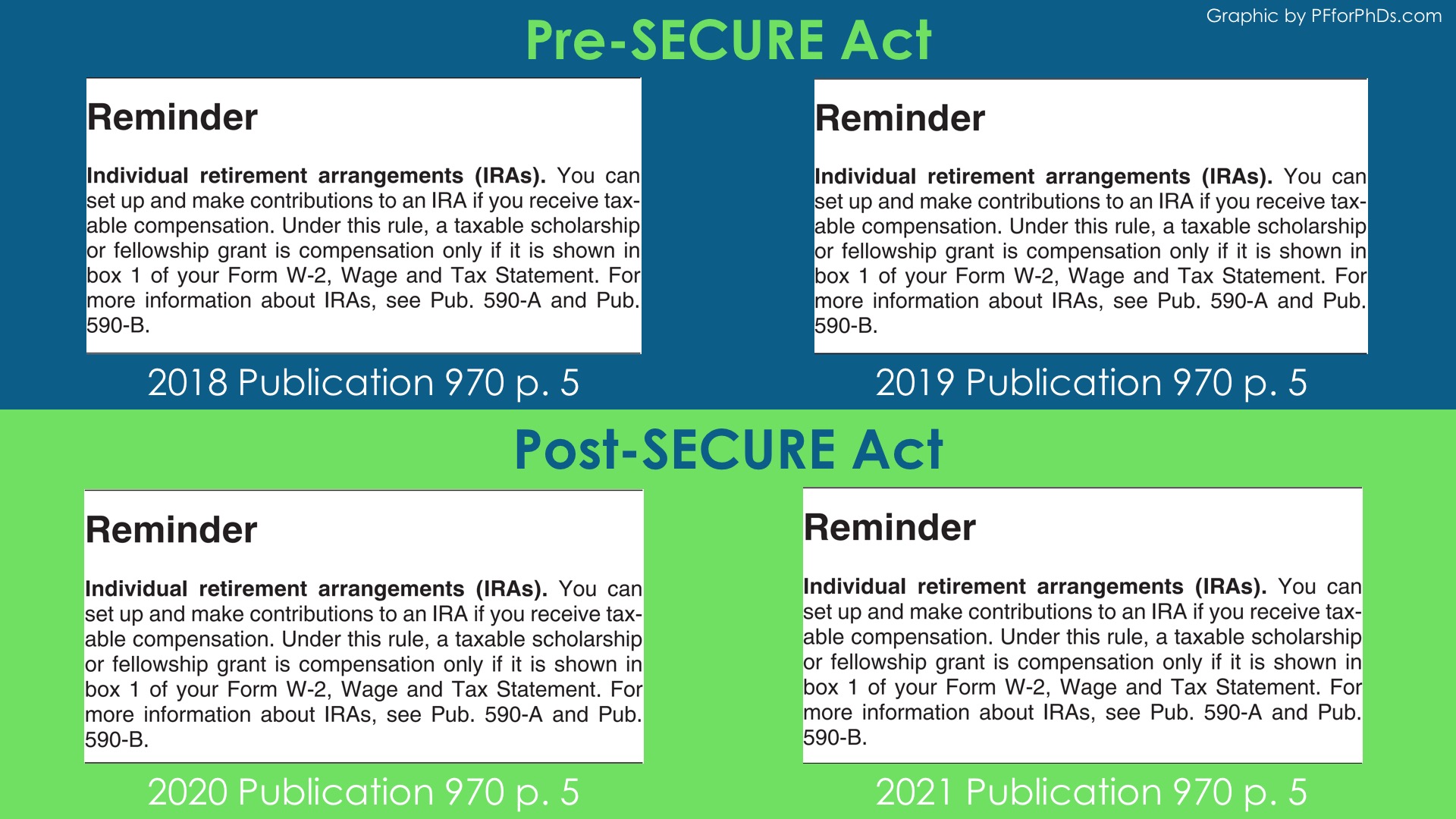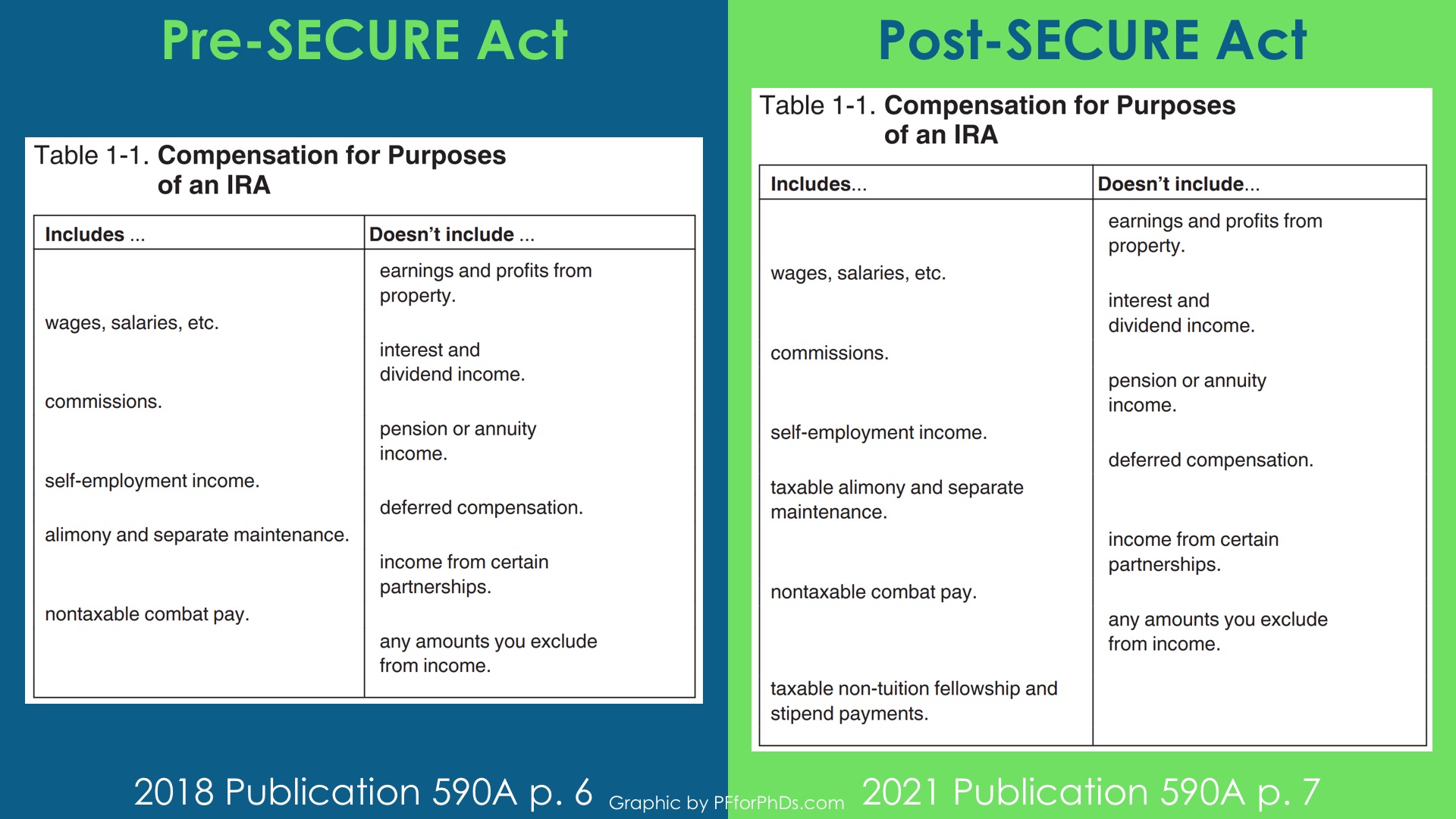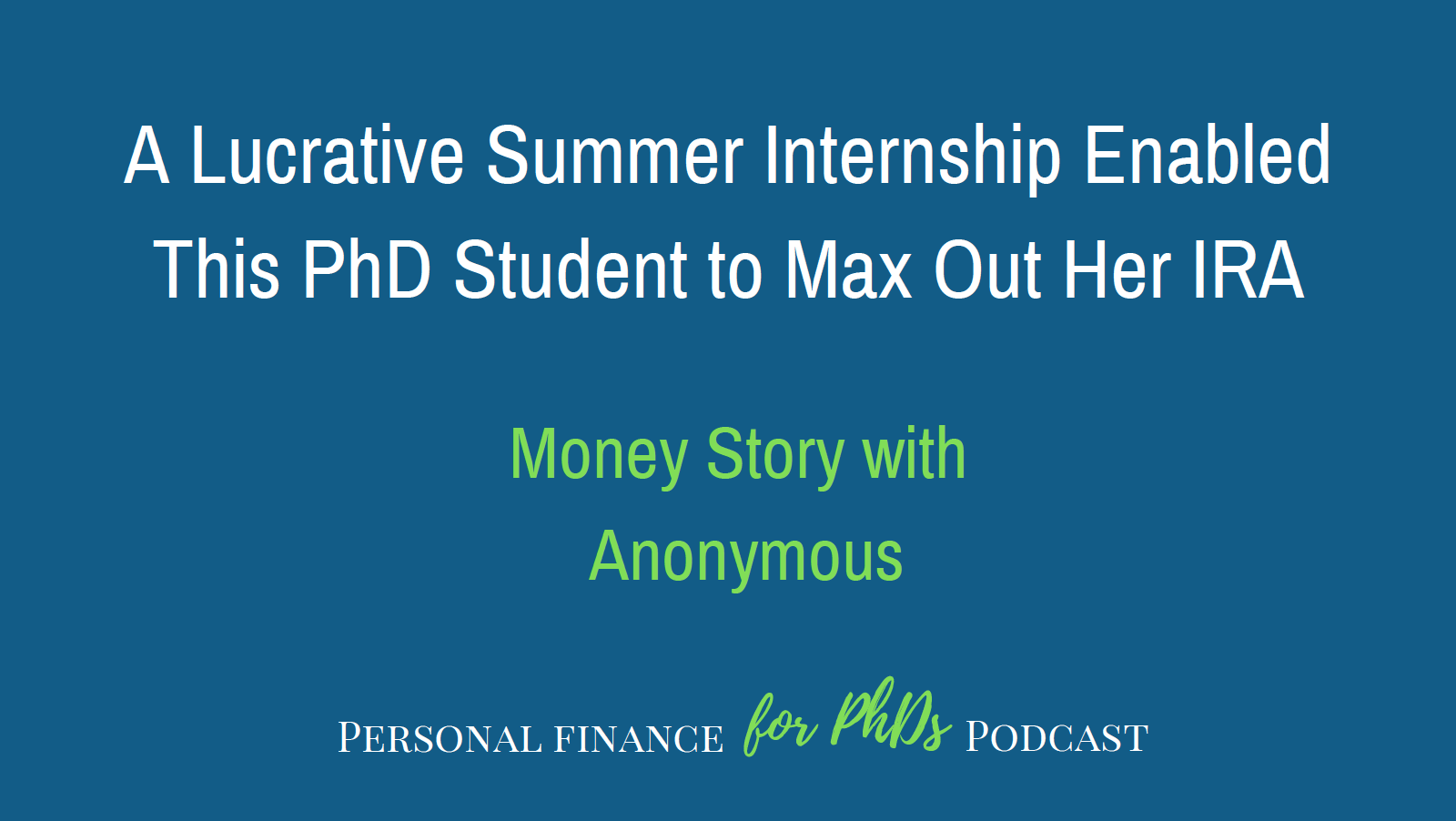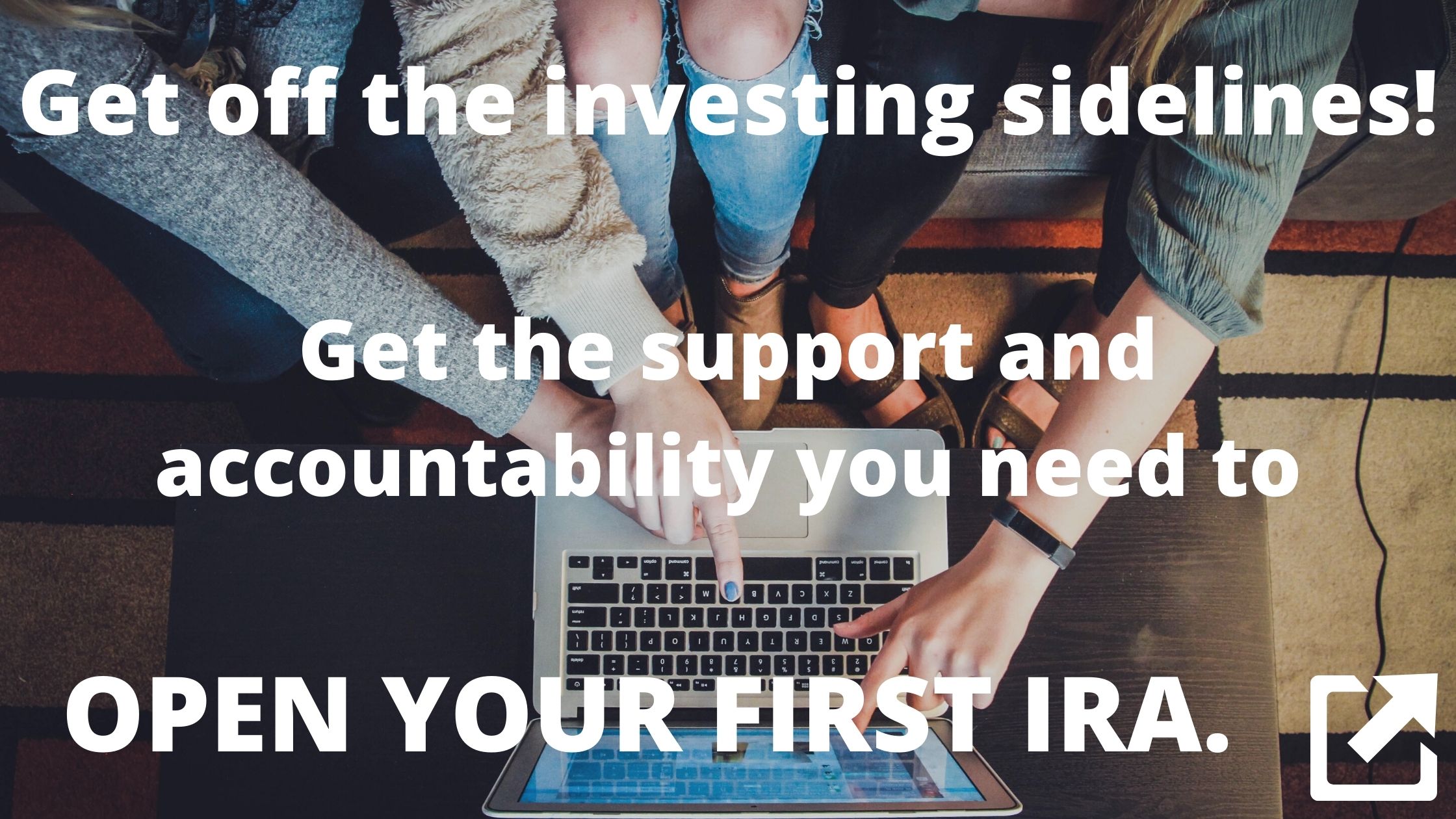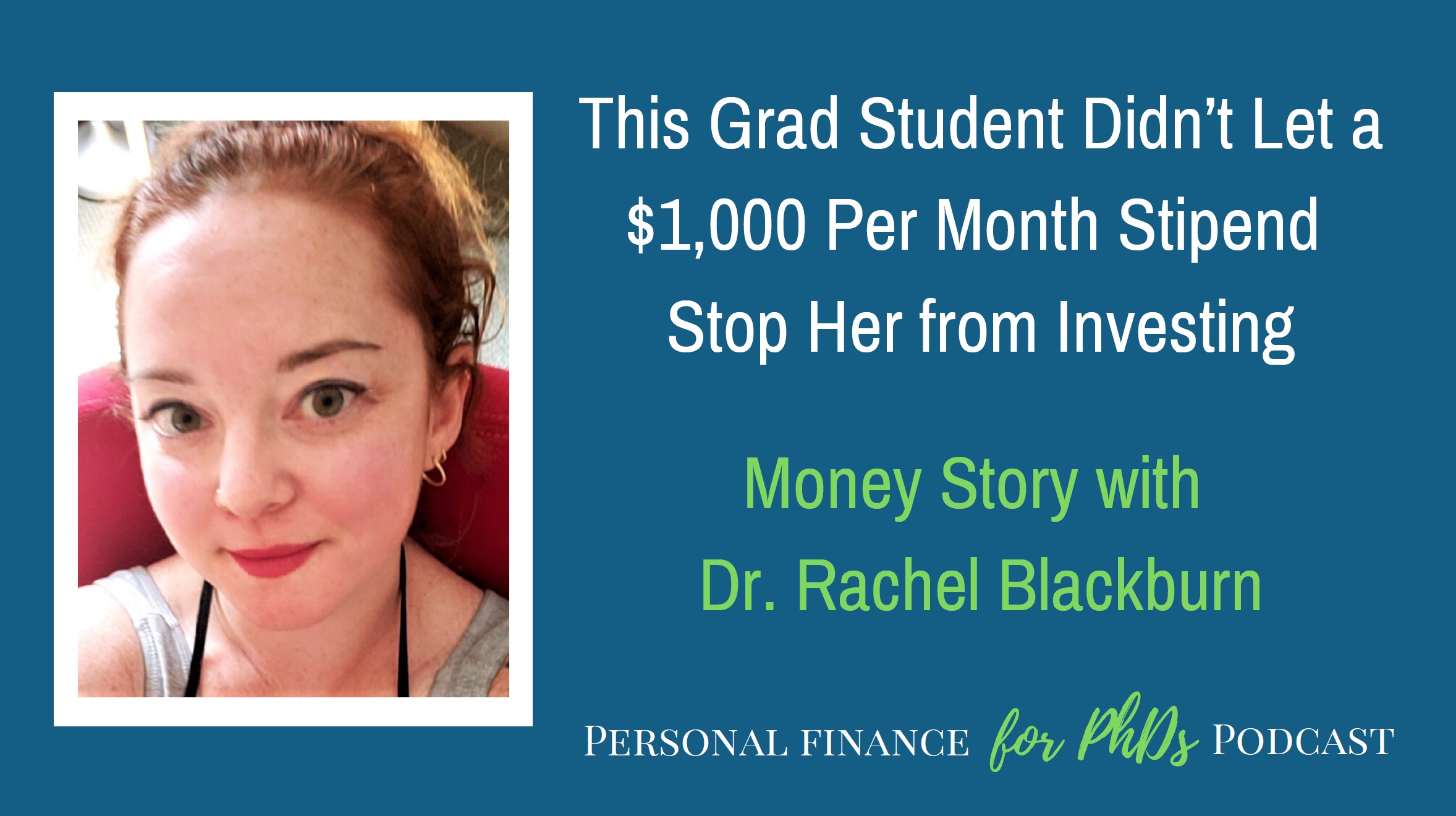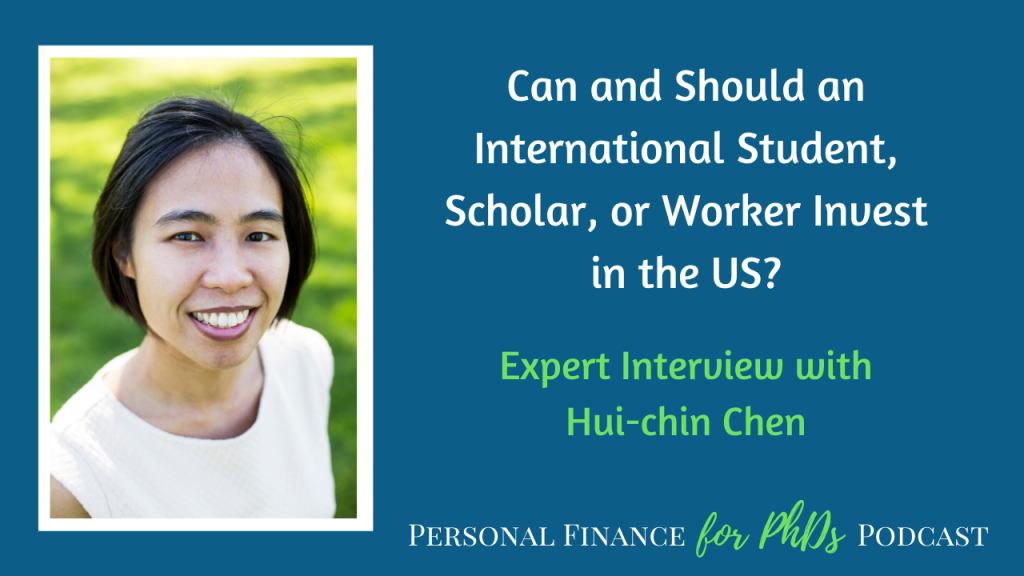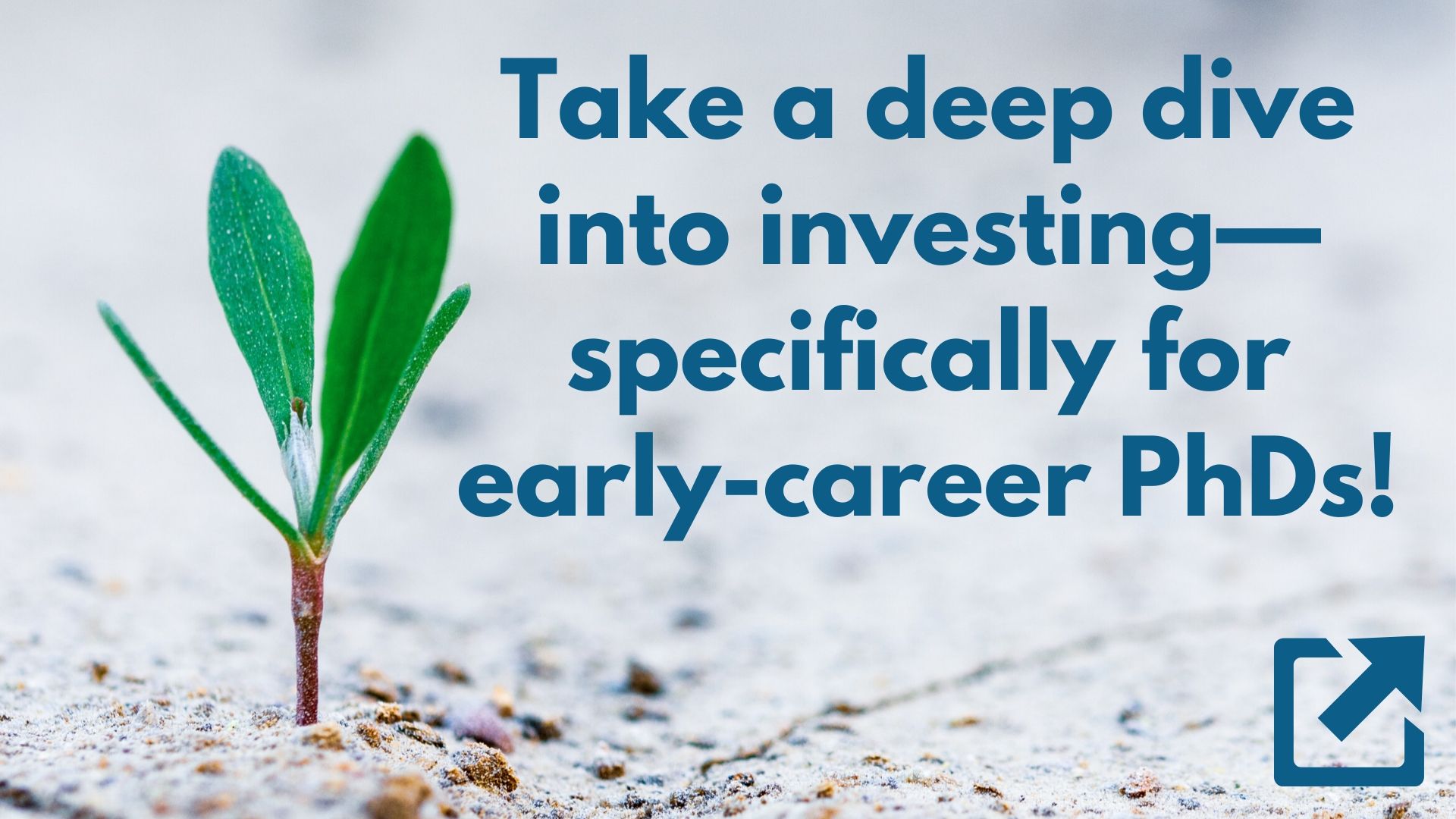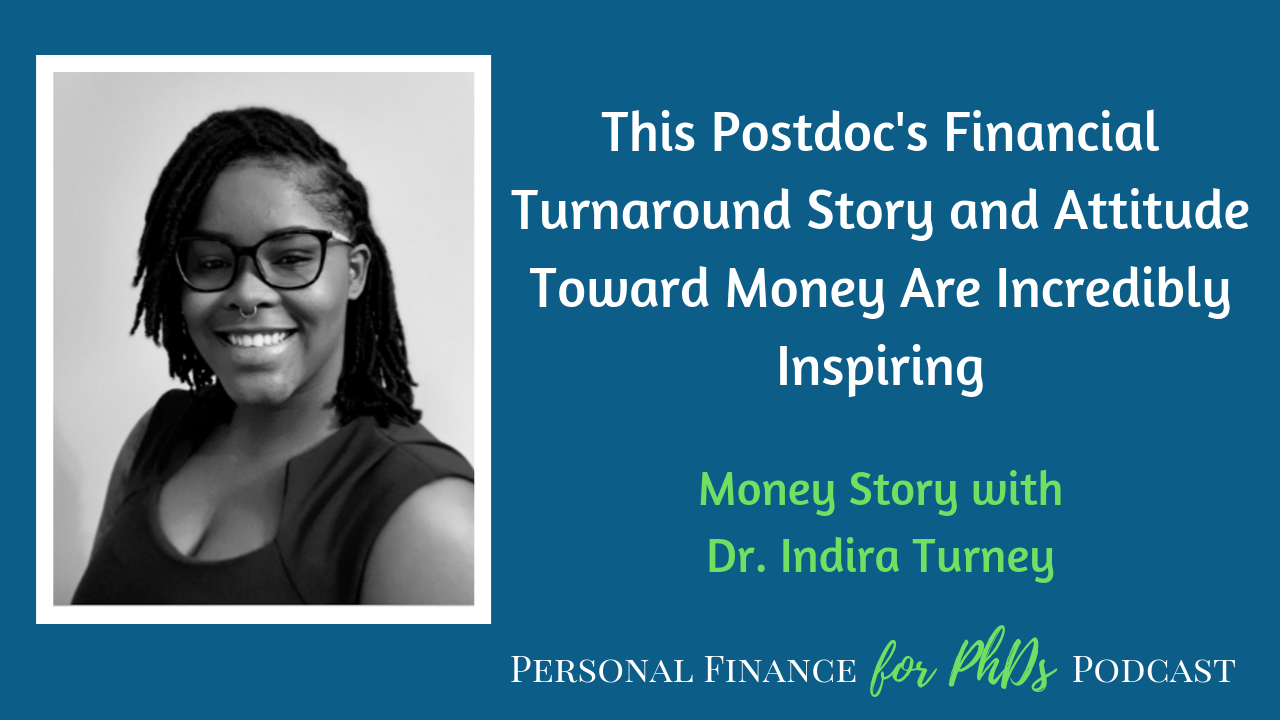In this episode, Emily interviews Gauri Patel, a first-year grad student in biomedical engineering at the University of Texas at Austin. Gauri is on an F-1 visa, but she has lived in the US for over 10 years. The financial questions Gauri has encountered are different from those typically asked by both US citizens and new international students. Gauri and Emily discuss bank accounts, retirement accounts, tax reporting, and the cost of immigrating to the US.
Links mentioned in the Episode
- Host a PF for PhDs Tax Seminar at Your Institution
- PF for PhDs Tax Center for PhDs-in-Training
- PF for PhDs S4E17: Can and Should an International Student, Scholar, or Worker Invest in the US?
- PF for PhDs Subscribe to Mailing List
- PF for PhDs Podcast Hub
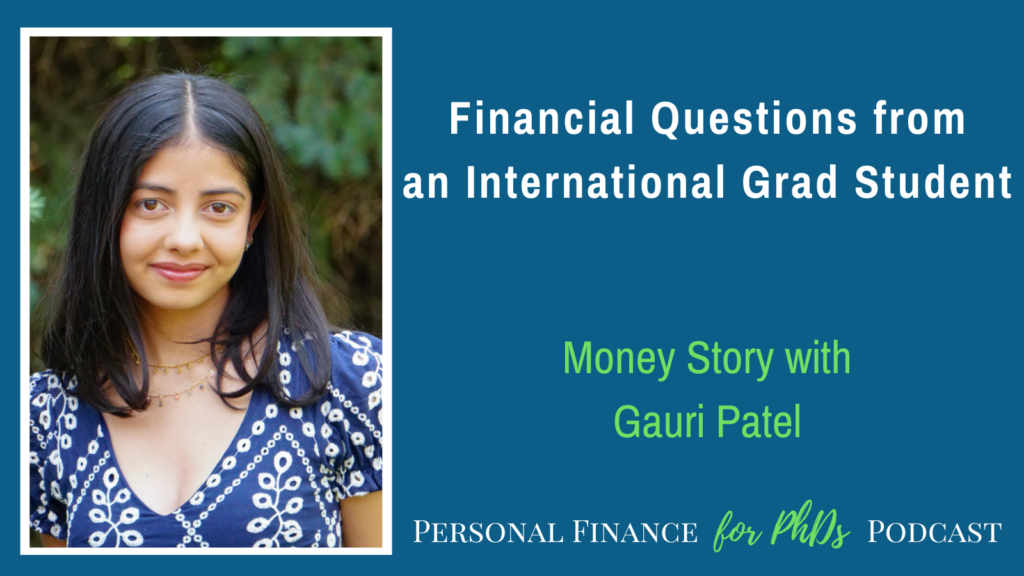
Teaser
Gauri (00:00): I’m the type of person to gather all the information before doing things, but that can hinder progress if you just keep adding more bits of information rather than like acting on what you already know. I spent a little too long deciding like, oh, which, which company to go with. But yes, I I was able to open up the Roth IRA.
Introduction
Emily (00:28): Welcome to the Personal Finance for PhDs Podcast: A Higher Education in Personal Finance. This podcast is for PhDs and PhDs-to-be who want to explore the hidden curriculum of finances to learn the best practices for money management, career advancement, and advocacy for yourself and others. I’m your host, Dr. Emily Roberts, a financial educator specializing in early-career PhDs and founder of Personal Finance for PhDs.
Emily (00:59): This is Season 20, Episode 2, and today my guest is Gauri Patel, a first-year grad student in biomedical engineering at the University of Texas at Austin. Gauri is on an F-1 visa, but she has lived in the US for over 10 years. The financial questions Gauri has encountered are different from those typically asked by both US citizens and new international students. Gauri and I discuss bank accounts, retirement accounts, tax reporting, and the cost of immigrating to the US.
Emily (01:30): The tax year 2024 version of my tax return preparation workshop, How to Complete Your PhD Trainee Tax Return (and Understand It, Too!), is now available! This pre-recorded educational workshop explains how to identify, calculate, and report your higher education-related income and expenses on your federal tax return. Whether you are a graduate student, postdoc, or postbac, domestic or international, there is a version of this workshop designed just for you. While I do sell these workshops to individuals, I prefer to license them to universities so that the graduate students, postdocs, and postbacs can access them for free. Would you please reach out to your graduate school, graduate student government, postdoc office, international house, fellowship coordinator, etc. to request that they sponsor this workshop for you and your peers? You can find more information about licensing these workshops at P F f o r P h D s dot com slash tax dash workshops. Please pass that page on to the potential sponsor. Thank you so, so much for doing so! You can find the show notes for this episode at PFforPhDs.com/s20e2/. Without further ado, here’s my interview with Gauri Patel.
Will You Please Introduce Yourself Further?
Emily (03:06): I am delighted to have joining me on the podcast today, Gauri Patel, a first year PhD student in biomedical engineering at UT Austin, and today Gauri and I are going to discuss being an international graduate student, but one who has been in the US for a significant amount of time and how the financial questions that you have at that stage are different than either you know, domestic graduate students or people who are international students and brand new to the US. So I’m really excited to learn from Gauri about this. So Gauri, will you please introduce yourself a little bit further for the audience.
Gauri (03:37): Thank you so much Dr. Roberts. So I, as you mentioned, I am a first year graduate student at the University of Texas at Austin and I’m studying biomedical engineering, uh, specifically in biomedical imaging. So my start in this field was during my master’s thesis where I studied a particular image analysis technique to understand how a tumor microenvironment could influence outcomes to therapy. And so I want to continue studying this and so here I am, uh, doing more research at, uh, in a PhD program.
Emily (04:14): Excellent. Well, let’s kind of rewind the clock and take us back to, uh, maybe when you first, uh, entered the US and tell us about how that happened.
Gauri (04:23): I first moved to the US pretty much exactly 11 years ago. Uh, and it was because my dad had found a job in Michigan and so at at that age you don’t really have much of a say in where you’re going. And so my family moved to the states and I’ve been in Michigan ever since.
Visa Status: H-1B, H-4, F-1
Emily (04:46): So tell me how that works visa wise. ’cause I know, I’m gonna guess your father was on an H-1B, but I don’t know how the family aspect of that works.
Gauri (04:55): He eventually got to an H-1B, so we moved from Canada to the US and so Canada, there’s a different visa category that my dad could also work under. So he first started on a TN visa and I was on whatever dependent version of the TN there is. I’m not sure what the name of that is exactly, it was quite a while ago, but then eventually he did get moved over onto an H-1B, after which I was on an H-4 visa, which is a dependent of the H-1B. And I basically stayed on that, um, from middle school through high school and then my first year of my undergrad.
Emily (05:34): Okay. And then from your second year of undergrad, did you start on F1 visa at that time?
Gauri (05:40): I switched to an F1 during my second year of my undergrad and that was because I wanted an opportunity to do internships or paid research on campus. Uh, so the H-4 visa, you require some type of worth work auth- authorization and that there’s a different timeline about when you’d be able to work. It has to go through a different approval process and it’s kind of like up in the air when that, uh, work authorization would come through. And so if I was on an F1 visa, it would be rather immediate. I would do a year of school and during that time I would be permitted to work in a research capacity on campus. And also it’s pretty immediate you can get authorization for CPT or OPT and so that’s why I switched to the F1.
Emily (06:34): That certainly seems like a reasonable reason to, to, you know, make that switch. I’m wondering were there any downsides, like anything that you were foregoing or giving up by making that switch?
Gauri (06:44): Yeah, for sure. So since my family was on an H-1 was under the H-1B visa category, there’s also the option to apply, have your employer sponsor for a green card. And so that’s like the main perk of the H-1B visa. It can eventually lead to a green card. However children, they age out at 21 and so I was like really getting close to that point of aging out. And so the question remained, do we still hang on to this H4 dependent visa and not be able to work in the hopes that before I turned 21 I would, that green card would, you know, go through or do I switch immediately and you know, cut my losses. And so, uh, we just decided that the green card was probably not gonna happen before I turned 21. And so I might as well switch to the h uh, sorry, excuse me. F1 visa at this time.
Emily (07:53): Well I wanna kind of pick up with the green card process maybe a little bit later in our conversation, but let’s kind of go back with um, your experience, you know, doing research and everything through your undergrad. Um, it totally makes sense to me that you would want to have those potentially paid research experiences where you already thinking at that time that you wanted to pursue, uh, your field or science generally or like did this basically the switch to allow you these experiences. Were you thinking ahead to graduate school, I guess is what I’m asking?
Gauri (08:24): Yeah, for sure. So I first started off, um, my first year I was pretty set on pre-med. I wanted to go to medical school, um, and pre-med the curriculum makes you jump through like a lot of hoops, like oh, do shadowing and do research hours and all that. And so that’s how I got into research in the first place. But I ended up liking it so much that I abandoned the pre-med track and I’m like, I think this is the research is just what I’m interested in general. And so the F1 visa definitely helped. It also would’ve been helpful for pre-med purposes as well to get like clinical hours maybe, you know, work in some, some sort of, um, healthcare setting. So working somewhere was like whether I wanted to go to graduate school in research, in a research capacity or to medical school working somewhere had to have happened.
Family and Personal Finances
Emily (09:21): Yeah, that makes sense. Um, since we’re talking about work then and paid work and so forth, can you tell me a little bit about, doesn’t necessarily have to be your family’s finances, but like what was going on for you financially during that time and especially if there were any tie-ins then with like your visa status or your choices around that.
Gauri (09:39): Finances were never really a struggle for my family, which I’m very grateful for. Um, because I, as an international student, I didn’t get any financial aid or qualified for federal student loans, so everything did have to come out of pocket. So more about having paid work, it was more about, um, finding a sense of autonomy and not having to rely on, you know, my family being my safety net all the time. And so that’s why I was interested in the paid work.
Emily (10:14): And you told me during our, um, pre-interview chat that you started listening to financial podcasts even as an undergrad, including this podcast. And so what led you in that direction of like being interested in finances even at that stage?
Gauri (10:28): Oh yeah, it was pretty much, so I worked in this, um, lab as a volunteer for two semesters and then that summer after I asked them like, Hey, can I stay for the summer and work here full time and also get paid perhaps? And they were like, yeah, sure we can make that happen. Um, in hindsight I didn’t realize how like, oh wow, that actually happened <laugh>. Um, now that I know more about the research space like that, that was kind of incredible that that happened. But anyway, so I, I’m like, oh, I’m about to get money for the first time. Um, and unlike some of my peers that I went to high school with, they all worked like, you know, jobs, um, at like the local ice cream shop or they were, you know, hosts at, you know, some type of diner or they tutored on the side. I couldn’t do that on the H-4 visa. And so up until this point I’d just been volunteering. This was quite literally like my first paycheck. And so I was like, what do I do with this? What could I possibly do with this? And I’m just the type of person to go poking and prodding for answers. And so I went to finance podcasts.
Emily (11:49): Yeah, that’s great to hear. Um, I think when I had a similar like transition, you know, coming out of undergrad and getting like my first stipend paychecks, like after that I was asking the same questions like, oh, uh, never had this control over money before. Like, what exactly do I do with this? I went to books because podcasting was barely a thing back then, but that’s awesome that we have so many different like avenues you can go to now. Um, okay. So anything else you’d like to share with us? Maybe about the transition from, you know, finishing up undergrad and your master’s into graduate school in terms of your finances and then we can kind of dig into the, um, specific questions or concerns that like someone in your position has?
Gauri (12:29): I think the only big difference between my undergrad and master’s and then grad school now is that in undergrad and Master’s, the amount I was making was like, it, it couldn’t sustain all of me. Um, my family was helping out with tuition entirely and then now it’s a, a different ball game. Like I, I can more or less like take care of myself on this stipend. And so that autonomy I was like really searching for. Um, I I feel like it’s like finally coming to fruition like, oh, it’s happened.
Emily (13:06): So when you kind of approached me about doing this episode, you were saying, okay, yes, I’m an international student but I don’t have the same concerns of a brand new to the US international student and I also have different concerns going on than someone who is already a citizen or resident. So just like point by point like let’s talk through like what you’ve encountered and sort of what you’d like to share with other, other listeners who might be in a similar situation.
Choosing a Bank as an International Student in the US
Gauri (13:30): Yeah, for sure. So the first thing, um, you do is when when you get some type of money in your hands, it’s like I have to put this somewhere. And so it’s the first question is like, oh, what bank do I choose? And so I was consuming this financial content and it was like, oh, you should start saving up for an emergency fund and moreover you should put it in a high yield savings account, but for international students there are only a certain number of banks that will offer their services to you. And so the first bank account I had was, um, a Chase bank account. Um, I don’t know if it’s okay to name names.
Emily (14:07): Oh yeah, go ahead.
Gauri (14:07): For banks. Okay. So it was a Chase bank account and it had some like stipulations on the minimum balance that should be in there. It didn’t offer any interest at all. And so in terms of all the different banks you could choose from, you’re limited to a very set few. Um, so I had that bank account first, but then finally after I got the work authorization to work on campus in this uh, lab and then after I got the social security number associated with it, it was after all that that I could open this bank account. And so anytime you hear like, oh, do this, do X, y, and z, like a pretty actionable step, that seems easy enough. Um, I always seem to find like, oh I need to have this before I can do this thing.
Emily (15:05): Yeah, it is, it is really hard at like as a podcaster, someone who does one to many communications, it’s really hard <laugh> to keep all audiences in mind and speak to like all audiences. So you’re absolutely right. Like if you’re listening to a US based, you know, personal finance podcast or like reading a book or something else, like you definitely have to put another filter on that and say like, okay, <laugh>, is this actually going to be possible for me? And the answer is like, just like you said, yeah, there are banks that will work with you, it’s just not necessarily every bank and not everyone’s gonna make it easy and some people need the SSN and some don’t and so forth. So like you just have to be, there’s just another selection criteria on that. Absolutely. Have you, so since like having that Chase bank at first, have you subsequently opened or been able to open any other types of like higher yield savings or something like that?
Gauri (15:51): Yeah, for sure. I primarily use uh, my SoFi bank account now and it was pretty easy to like get the account, but it’s only after you’ve got some type of job lined up and you’re getting paid for it and you’ve got like all the things that come with the job first, like you need to have that SSN which um, is not like a oh I’ll just like apply for it type of thing. They’re finding the job is not like the easiest thing in the world. So you could hear the fi- finance advice but know that there are steps before steps you must take before you can, you know, enact those. Um, yeah, in general it’s like a thing I have to Google, like, oh open up a Roth IRA, can I open up a Roth IRA is something I have to Google.
Commercial
Emily (16:42): Emily here for a brief interlude! Tax season is in full swing, and the best place to go for information tailored to you as a grad student, postdoc, or postbac, is PFforPhDs.com/tax/. From that page I have linked to all of my free tax resources, many of which I have updated for this tax year. On that page you will find podcast episodes, videos, and articles on all kinds of tax topics relevant to PhDs and PhDs-to-be. There are also opportunities to join the Personal Finance for PhDs mailing list to receive PDF summaries and spreadsheets that you can work with. Again, you can find all of these free resources linked from PFforPhDs.com/tax/. Now back to the interview.
Opening a Roth IRA as an International Student in the US
Emily (17:34): Yeah, let’s talk about that question. Um, so you heard about Roth IRAs, I’m sure through all the content that you were consuming and uh, tell me what year that was when you like first learned about a Roth IRA,
Gauri (17:46): I actually learned about a Roth IRA back in high school and so my high school offered a finance class and so they tried to teach us about, um, saving for retirement and 401Ks and Roth IRAs and whatnot, but I don’t think it like fully sunk into our minds yet about how significant those things were. So I heard about a Roth IRA before, um, I didn’t fully grasp its like importance until I started listening to like finance content a few years later.
Emily (18:21): Yeah. So when did you like start googling that question? When did you feel like, okay, as an imminent step I would like to open this kind of account and I really need to figure out if I’m able to? When did that happen?
Gauri (18:31): I think that was two years ago. I was like, I’ve listened to all this advice. Um, so I’m the type of person to gather all the information before doing things, but that can hinder progress if you just keep adding more bits of information rather than like acting on what you already know. So I knew that I needed the Roth IRA and I was like, you know what, fine, let’s, let’s just start googling. Um, can I, can I open this and who’s willing to offer this to me?
Emily (19:01): Yeah. And what did you find?
Gauri (19:04): I think it was from your podcast, like some interview a while back, um, and there was like a snippet. I remember watching like as an international student you can open a Roth IRA and I’m like, oh check. Fabulous. Um, now I spent a little too long deciding like, oh, which, which uh, investment bank or like, which, which company to go with. But yes, I I was able to open up the Roth IRA <laugh>.
Emily (19:31): Yeah, that I think you’re referring to the interview I did with Hui-chin Chen who’s a CFP. And I think that we recorded that back in like maybe 2018 or 2019. And even by then I had been getting regularly questions in my like, live seminars from international students, can I open a Roth ira? Should I open one? You know, is it allowed? Is it a good idea? And so I was really, really glad to get an expert on the podcast who could help us with all those questions. But the, the gen, I mean people who are interested should listen to that full episode. But yeah, the, the general, uh, takeaway was like, yep, <laugh>, if you want to invest like while you’re an international student or postdoc in the US go ahead and do it now with a Roth IRA specifically, you still need to fulfill the, um, taxable compensation requirement to be able to make those contributions. Did you have to like, I don’t know if you were receiving W2, you know, employee type income at that time, maybe it wasn’t so much a question for you or is that, is that taxable compensation question something you also had to investigate?
Gauri (20:30): I don’t think I investigated it that much because at the time I really wasn’t earning all that to put anything into the Roth IRA, so it was just open for a while and it, my income definitely wasn’t a W2, it was actually a 1099, but I think from another series of, not another series, but like another episode or couple of episodes of yours, um, I think you went over the old guidance before 2020 and then after 2020 and it was like, yes, 1099 income can be uh, put into a Roth IRA. And so I was like, oh great. So I I could have done it all along. Um, not that there was anything left <laugh>.
Emily (21:16): Yeah, that definitely did change to have fellowship income not reported on W2 eligible to be contributed starting in um, 2020. But you still had that added wrinkle of like as an international student, as a non-resident in the us um, we’ve settled like the compensation term in, in taxable compensation, but you also had to know that your income was taxable in the US and I don’t know, would you like to share like what is your technical country of residence? It seems so silly to say that ’cause you’ve been here for so long, but like what is your country of residence?
Gauri (21:47): I think right now for tax purposes, it is not the US I think it switches to the US in a year. I think it’s like five years. Mm-hmm <affirmative>. Yeah, that I can say I’m on my tax. I’m like, not from here, but after five years of saying that you are from here now for as far as taxes are concerned.
Emily (22:09): Yes. So I don’t know the Canadian US tax treaty intimately, but I’m pretty confident that your income was then taxable in the US at least to some extent. So you did have that eligibility mm-hmm <affirmative>. Yep. So yeah, that’s great. But like you said, like, you know, US citizens, residents and so forth, they have this one bar of like questions they have to ask about the Roth IRA and then there’s that further bar that, you know, international non-residents have to ask. So I’m really glad that we kind of reviewed that to like, you know, point people back to that other resource and like get that all out there because like it is such an amazing tool. Um, and it’s really a shame to miss out on it if you’re ready to contribute to one just because you might have some outstanding questions that, you know, they can take a little bit of time to resolve those. So hopefully we resolved a few for the listeners. Um, is there anything else that you’d like to add on that? Like Roth IRA question?
Gauri (23:03): I think that’s about all. Just, uh, don’t let the tail wag the dog as, as they say. So I had the account open but I wasn’t like too worried about what could go in there. Um, it all worked out in the end for me, but I think if I got too caught up in the weeds, I I don’t think the account would’ve ever been opened or I would’ve ever put anything in there <laugh>.
Emily (23:25): Yeah, I totally agree. And it’s, and it’s this area of investing where people that in my observation seem to have the most like analysis paralysis. Um, and I, maybe you’ve heard me say this on podcast before, I’ve probably told the story, but like I made like a huge mistake when I first opened my Roth IRA, which is that I didn’t actually invest the money that I was putting in and yet it’s really good that I started it and started contributing even though I made like a huge mistake with it. Like, I mean we have a decades, decades long investing journey ahead of us, so like it’s better to just get started even imperfectly than to just like wait and wait and wait and wait and not do anything. It’s totally okay to make relatively minor mistakes. You can overcome them along, along the journey. What was your third uh, point that you wanted to bring up?
Opening a 403B as an International Student in the US
Gauri (24:08): So I figured out the bank account, I figured out the Roth IRA and then now my question is, hmm, I still have some more left to save. Can I open a 403B? Which the answer is yes, but then all of this additional money that I have, it’s coming from a fellowship which according to my university, it’ll be reported on a 1042s form, which I’ve never encountered before. Um, from my searches on Google, I don’t see that much guidance for graduate students with this form. It’s more about US citizens that have moved abroad that, that received this form and I’m like, I’m, I’m not that <laugh>. I’m very much the opposite. I’m a non-citizen within the US so the jury is still out. I’ve emailed like the tax folk at my university regarding like, Hey, would you happen to know if this can be put in a 403B or a Roth IRA or like any tax advantaged account and they’re like, sorry, we can’t give tax advice.
Post-Interview 403B Contribution Follow-Up
Emily (25:19): Hi y’all, this is Emily breaking in during the editing process. Gauri and I talked for a bit here about her 403(b) and her tax situation, but I wasn’t quite asking the right questions, so we ended up exchanging several emails after the interview to sort it out. Here’s what we figured out: Gauri has two types of income. She’s an employee throughout the year and also receives supplemental fellowship income. Her employee income exceeds $10,000 per year and therefore is not subject to the US-Canada tax treaty, so it is fully taxable and reported on a Form W-2. As a nonresident, her fellowship income is reported on a Form 1042-S with income code 16, and it is also fully taxable. Gauri’s question was whether or not she could contribute her Form 1042-S income to her 403(b), and the answer to that is no because it is fellowship income and only employee income can be contributed to a 403(b). But she does have employee income, and that’s why her university allowed her to open the account and she could contribute to it from her employee, i.e., W-2, income if she chose to. The reason she particularly was asking if she could contribute the fellowship i.e., Form 1042-S, income to her 403(b) is because of the automatic 14% income tax withholding rate, which is rather high compared to her effective tax rate. So our conclusion is that she can contribute to the 403(b), but not from the particular pot of money that she wanted to, and even though she has that annoyingly high income tax withholding rate, it’s all going to come out in the wash at tax time, likely in the form of a tax refund. OK now back to the interview!
Building a Financially Stable Life in the US as an International Student
Emily (26:52): Was there any other, another point that you’d like to bring up in this sort of question about having been in the US for like a very long time yet still being on this F1 status?
Gauri (27:03): The main goal of consuming all the finance content is, so answering the question of like how do I build a financially stable or good life for myself years in the future if I’m in the US but because of my visa I also have to, it’s like vacillating between yes, think long term, but also what if you’re not here long term? What then? Um, so of course that opens a can of worms, like what if this, what if that? But I just have to work with, let’s just assume I’m gonna be here for some indefinite amount of time and then if the day that I have to go back to Canada comes, um, I will deal with extricating myself from all of this money that’s invested in these US-based, um, accounts at that point. Um, I think it would, it would be like a hindrance if I constantly worried about it right now.
Emily (28:09): Yeah. And I I’m really not sure what steps you would that would be practical to take, um, to, you know, think about this possible future where you would be living in Canada, um, I don’t know, open a Canadian bank account. Like I’m not even sure what would be like a reasonable thing to do, um, like you said for an outcome that you’re hoping is not going to come about and has a probably a low chance of actually coming about. I think you’re exactly right. Just to say like, I’m gonna build what I can here and if the day comes when I have to make a change, I’ll make a change then, but you don’t need to anticipate that. Yeah, and I think that was the answer too from that podcast episode with, um, with Hui-chin Chen. She was just saying like, yeah, if you end up leaving the US later whether because you wanted to or because you had to or whatever the reason, you can sort of cross that bridge when you come to it. Like don’t let that be a reason for you to not build wealth and build your financial life in the US. So I think you’re taking exactly the right path.
Gauri (29:08): That’s fabulous to hear.
Current Financial Goals
Emily (29:09): <laugh> Do you have any current financial goals?
Gauri (29:14): Current financial goals? So the immediate thing would be to restore my emergency fund. So my emergency savings, I had to draw out of that for moving to Austin from Michigan. And so the moving costs and then furnishing, you know, the apartment, the first few months of, you know, rent before the, uh, the stipend payments came in. I used my savings to tide me over during that time. And so right now I, I need to work on restoring that amount. Um, so that’s my immediate goal. And then once that’s done, I think that should take up to a year, depending on how aggressive I’d like to be at. After that point, I will have to decide where to redirect those extra funds that were going into my, um, emergency savings, like should I put that into a taxable brokerage account or finally answer that 403B question. And so send that, send those funds over there. Where should those go would be the next question.
Emily (30:25): And are you also thinking about a potential green card in the near future and like what are the, because I know there’s sometimes hefty financial costs associated with that transition.
Gauri (30:34): Oh yeah, for sure. So the past, I think two or three years, uh, my Visa has cost about $500 a year in different work authorization fees or different petition fees. So I already have that in the back of my mind. Like, oh, every time I need to do something with my visa, it’ll be a couple hundred dollars. But for a green card application for someone that is seeking a PhD, there is a employment based visa that I myself could petition for if I demonstrate that I’ve done outstanding research in my field and I’m a person worthy of staying in the us. Um, and so just for that, just for two forms relating to that, I think it’s um, called, it’s called Immigration for Alien Worker or Petition for an Alien Worker, something along those lines. The fee for that is around $700 and then the adjustment of status. So to adjust my status from an F1 to this employment based visa, that would be around $1,400. And so just for those two forms, if I were to go about it without the help of any sort of immigration lawyers, whatnot, that’s already over two grand. So I definitely need to have some sort of bucket larger than a couple hundred dollars ready to go for when that day comes about. And also I have to decide like, do I even wanna pursue that path or would I prefer to just go the more routine route, which is employment based, um, visa. So like pursuing an H-1B track, so up in the air.
Emily (32:31): How will you make that decision? Or I guess I’m also asking like you mentioned earlier about, you know, the number of years you’d been in the US and having to make a decision about F1 versus staying on the previous status. Um, is there an amount of time that you’re looking at where you’ll, that you’ve been in the US where you or been on the F1 visa where you’ll need to make this decision? Or is it really kind of up to you? You can do it at any point?
Gauri (32:53): The sooner it happens, the sooner like a weight would be lifted off my shoulders about like this always, you know, you have to keep in the back of your mind that like you’re not necessarily here forever, whether you choose to be or not to be here forever. So it would be like a mental weight, you know, relieved. Um, the F1, since I’m in a STEM field, I could have my OPT go for I think up to three years with the extension. And so within those like three years, I’d have to make some type of decision about whether my employer can sponsor for an H-1B visa or I’m going to go about it on my own. So it’s within the next eight years I have to come up with an, an exact plan about what would be the fastest, um, most efficient way to go about this process. Mm-hmm <affirmative>
Emily (33:53): And if you decide you wanna do it on your own and you have those fees that you’re looking at, plus maybe you, you might wanna pay a lawyer, um, to help you as well, are the finances going to hold you back or do you think you’ll be able to save up the requisite amount of money by the time you want to go about this process?
Gauri (34:10): I think I am well informed enough about how much this is going to cost me, and so I’d be able to plan for that regardless. It would still be a stretch, but it’s not like this is happening six months from now or you know, this is happening in just in a very short amount of time. Like I have the time to prepare for this type of scenario.
Traveling Back to Your Home Country as an International Student
Emily (34:36): I don’t know if this applies for you at all, but something I’ve seen happen with other international students, um, is that they need to go back to their home country every so often to deal with their visas. Has that ever come up for you and, and if not, is it ’cause you’ve been in the US under all these different statuses for so long? Or is it because of the relationship between US and Canada or like how does that work?
Gauri (34:57): It’s a US and Canada thing, so it’s a special caveat in this regard as well. So most students need to go through a Visa interview and actually receive approval to study in the US however, I’m Canadian and so I simply have to be accepted into a US university and show that I have some method of paying for my stay here and that’s all the evidence I have to give to study. I don’t have to continue to go back to Canada to renew my visa or even have any documentation for the exact visa.
Emily (35:41): I see. I’m just throwing that out. There’s another potential cost that I’ve seen international students bear uniquely these like high fees of international travel every, you know, few years to deal with that like particular issue. Um, yeah, I mean the more that obviously I, I was not an international student, so like, but the more I learned about the financial aspects of having this status in the US like it just, there’s just kind of more that burdens that kind of get thrown on the pile. Like, okay, no access to student loans, can’t side hustle, have to pay fees for visa related items, maybe for travel as well. Like just, it it emphasizes um, very deeply for me the importance of paying a living wage and not just a living wage more than a living wage to graduate students, especially international students because there’s just no, there’s no ways to pivot. Um, if you are financially on your own, if you’re financially independent from your family, then you have to make it work on the stipend like you’ve been talking about and you have all these additional, um, fees that can, that can pile up as well that domestic students don’t have to, don’t have to worry about. So yeah. Yeah. I’m really glad that, you know, you brought this up and that we got to have this conversation. Um, is there anything else that you wanna add about yeah, um, being an international student, having been in the US for so long? Or about your current financial goals or anything else?
OPT Application Tip for International Students in the US
Gauri (36:59): Pro tip for international students, um, when it comes time to send in your OPT application, do it the day you’re allowed to submit that application. So first you need all those signatures or you know, green lights from your advisor about like, yep, you’re ready to graduate and whatnot. That should be done before the 90 days. You have like a 90 day window before your last day of classes to apply for OPT. Have those ready to go. And on that like very first day of the 90 days apply for OPT then ’cause I did it right the first year after I grad, graduated from my undergrad and the second year I waited a few weeks and my OPT was delayed, I think over a month.
Emily (37:55): So it’s just for processing time, like you’re just saying like be the first one, like be first in line mm-hmm <affirmative>. Because if you delay then these applications are like piling up behind it and just pushes like the timeout. Is that right?
Gauri (38:06): Yeah, exactly. So when I was first in line, my OPT, like the EAD card arrived within three weeks. And so I had it well in advance of any start date and the second year round I was like, oh, it arrived in three weeks. I’ve got time.
Emily (38:26): You were complacent. Yeah, <laugh>.
Gauri (38:27): I was, I didn’t think I’d be so off base. Um, but yeah, don’t, don’t, don’t do what I did. <laugh>.
Best Financial Advice for Another Early-Career PhD
Emily (38:37): <laugh> Yeah, don’t do it <laugh>. Um, okay. Well thank you so much for that tip. And I’d like to end by asking you the question that I ask all of my guests, which is, what is your best financial advice for another early career PhD? And it can be something that we’ve touched on in the interview already, or it could be something completely new.
Gauri (38:53): I’ve learned that you need two savings buckets at least. So there’s the emergency when truly it’s an emergency and you have no sources of income whatsoever, and then a second bucket for yearly, like one off expenses, like, oh, there’s that vacation you’ve really been wanting to take or you have to travel for whatever reason. For me it’s like, you know, oh, here’s a couple hundred dollars for some visa related thing or I’m working in a STEM field. But I think all grad students in this day and age need a laptop or some type of technology of some sorts, and that’s pretty costly as well. And so, you know, your phone falls apart or your laptop needs to be replaced or you gotta go to a conference or whatnot. Um, there has to be like a separate bucket <laugh>, aside from the emergency savings. Um, and that, that having that separate bucket really relieves like a lot of stress, at least for me.
Emily (39:55): Yeah, this is like a major component of my teaching. I would say that’s different from like you mentioned listening to like financial feminists, for example, Tori Dunlap’s podcast, Her First 100K. Um, what I see in like the more general personal finance space is people talking to other people who have higher incomes high, you know, moderate to high incomes, which is just not the case for graduate students. And so things like having to pay for a plane ticket, well, you know, if your income’s high enough and you’re doing a great job with your personal finances, you know, keeping your rent low and all that stuff, like that’s not gonna be an issue for you, but it’s an issue for almost all graduate students to pay for those types of expenses. So like that is definitely an area that I have of much greater emphasis than other like personal finance teachers do because I totally agree with you. It takes so much stress off to have planned and prepared for those expenses in advance so that you’re not having to, I don’t know, like go to the food bank and like not, you know, put gas in your car and like all the stuff that you would have to do on the short term basis to sacrifice, to come up with money that you really needed if you, if you didn’t have that savings. So I love that tip. Thank you so much for sharing that. Um, and this was, it was wonderful to talk to you and thank you so much for teaching me and you know, asking the questions and you know, sharing the conclusions that you’ve come to along the way. And I wish you all the best in getting your, you know, status in the US secured in the way that you would like it in the near future.
Gauri (41:15): Thank you so much. It was great talking to you
Outtro
Emily (41:27): Listeners, thank you for joining me for this episode! I have a gift for you! You know that final question I ask of all my guests regarding their best financial advice? My team has collected short summaries of all the answers ever given on the podcast into a document that is updated with each new episode release. You can gain access to it by registering for my mailing list at PFforPhDs.com/advice/. Would you like to access transcripts or videos of each episode? I link the show notes for each episode from PFforPhDs.com/podcast/. See you in the next episode, and remember: You don’t have to have a PhD to succeed with personal finance… but it helps! Nothing you hear on this podcast should be taken as financial, tax, or legal advice for any individual. The music is “Stages of Awakening” by Podington Bear from the Free Music Archive and is shared under CC by NC. Podcast editing by me and show notes creation by Dr. Jill Hoffman.
